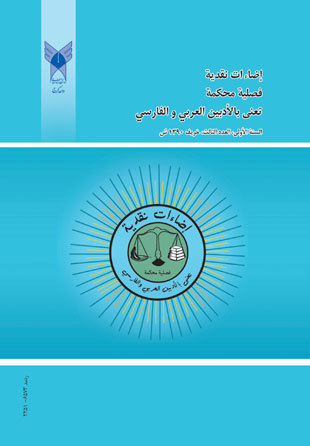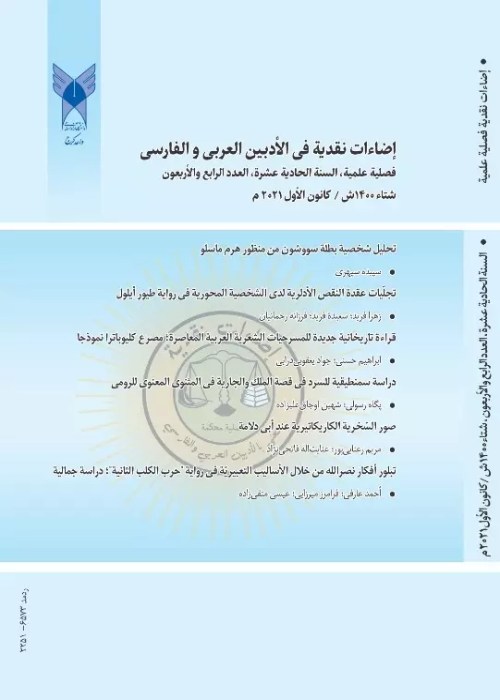فهرست مطالب

فصلنامه إضاءات نقدیه فی الادبین العربی و الفارسی
پیاپی 3 (خریف 2011)
- تاریخ انتشار: 1390/09/20
- تعداد عناوین: 8
-
-
صفحات 25-41
-
صفحات 67-89
-
صفحات 91-100
-
صفحات 101-116
-
Pages 9-23
Storytelling is a common phenomenon in all cultures. The Arab people also have recognized it and have preserved some of its heroes as well as the historical, moral heritage during different ages. However, novel and its elements is a modern genre which is borrowed from Europeans. The present paper examines the realistic novel of the master writer Hamd-Al-Hamd. The reader will eagerly pursue all cultural, and social transformations in his novel. The paper focuses on the writer’s devotion to the real life, incidents, and events.
Keywords: shams1516@yahoo.com -
Pages 25-41
Abou Hafs Omar Ebn Ali known as Ebn Farez is one of the Poets that lived during 6th century. He got a great reputation in the field of poetry. Many great critics such as Ebn khalkan who is the author of Vafiyatolayan also praised him, and they accepted him higher than his contemporary poets. In this article, we discuss some features of Soltan Alasheghin Ebn Farez. The main subject in poem of Ebn Farez is Ghazal. Other related main point (or subject) is khamriyeh, but his point of view in khamriyeh is different from Abunavas and others, and in this book he refers to the subject matter of the sufiyeh that is explained through Buteny’s comment. Also his poem is excellent due to diversity of pun and rhetoric.
Keywords: Ebne Farez, Sultan, Al, Asheghin, Khamriyeh, Mystical issues -
Pages 43-65
Unlike literal translations which are devoted to professional translation, interpretive translations are not merely concerned with the original text. This paper analyzes translations of Holy Koran with reference to some specific sections focusing on the following issues: comparative translation, omissions in translation, and unity of translation.
Keywords: translation, comparative translation -
Pages 67-89Elegiac writing is one of the most significant and permanent poetic aims, one of the most faithful genres to human essence whose major concern is human conscious. Due to the correspondence between elegiac composition and human mind there are rare poets who have not touched this area. Furthermore, some poets who are endowed with some inborn talent and sensitive emotion, have been essentially successful in poetic composition, even accompanied by some extrinsic impacts such as catastrophes and miseries. Ibne Rumi, no doubt can be classified in this category who suffered in his personal life as well. Among his outstanding poetic products both in form as well as in content one can refer to his ode “Rasae Basra” which is composed after the devastating invasion of Zangian to his city. The present paper is an attempt to analyze his ode on the level of form and style as well as content.Keywords: Elegiac composition, Ibne Rrumi, Abbasi era
-
Pages 91-100Post-Graduate, Arbic Literature, Islamic Azad University, Karaj Branch Novel is deemed as one of the highly elevated literary genres with a unique rank in Arabic Literature which deals with realities of the present time depicting the real essence of life as portrayed in Ebrahim’s novel Altalasos. Ibrahim portrays the social milieu of Egypt in 1948 in his novel, challenging some contemporary issues of his day. Narration and language are among the most significant artistic devices which act as the unifying elements in any great work. This paper deals with the narrative aspect of the novel. Relying on a child’s narrative point of view and his connection with the environment and external characters the author pays attention to details with a unique investigation of language.Keywords: artistic style, narrative techniques, language, dialogue
-
Pages 101-116The investigation of literary orations, their link with criticism, and the development of fields such as modern epistemology and linguistics has drawn the attention of many researchers since the middle of the twentieth century.These orations have the most pedagogical impacts on people since they apply figurative languages such as simile, metaphor, symbol, hymn, and rhetorical devices arousing the reader’s aesthetic taste and desire of inner satisfaction without any strict logical argumentation. The present paper studies the literary orations of Maghamate Hamedani through a reader-oriented approach.Keywords: literary oration, innovator, reader
-
Pages 117-131After a brief introduction on the connection between Persian and Arabic literature this paper examines Al javaheri’s impact of Iran. The paper is divided into three sections: the impact of the Iranian charming landscape and nature on Javaheri’s poetry; Javaheri and Iranian poetry; and Javaheri’s local color in Iran. The paper concludes with the general impact of Aljavaheri’s journey to Iran during his youth and the embodiment of the fusion of vast landscapes and poetical vocations in his poetry.Keywords: Javaheri, Iran, Persian literature, local color
-
Pages 133-143Studying through comparative literature in Arab world, we can find out that Arabic-Persian approach is one of the most important and fundamental elements in comparative literature studies among Arab countries. Obviously, we can also find out that studies in the case of the Arab’s relations with Iranians in the cultural and literal areas, especially through ancient era, is limited or stopped. Most of the Arab researchers and comparativists, in their studies have ignored current period. The ancient period is full of mutual interactions between the two cultures and many influences from the two sides. But in recent periods western culture has the deep impression on the two mentioned literatures as well. In this article, the most important comparative works in Arab world has been investigated critically, that is Al-hayat Al-atefiah bayn Al-Ozriah va Al-sofiah written by Dr. Ghonaymi Helal.Keywords: Comparative literature, French school, Mohammad Ghonaymi Helal, Leili va Majnoun


